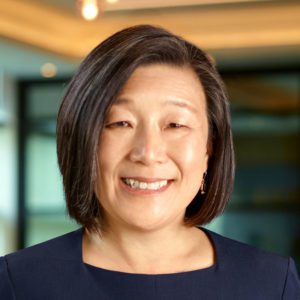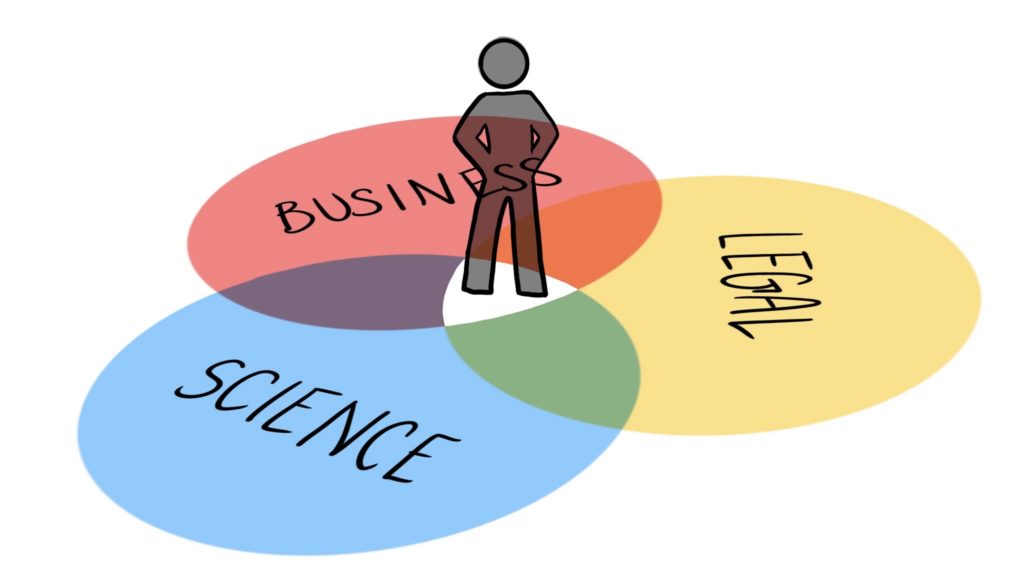Christine Ring, PhD, JD, is the secretary of Nurix and the company’s general counsel. Ring is joining the QB3-Berkeley Professionals in Residence (PIR) program on Friday, Feburary 11th for two in-person events in Stanley Hall on the UC Berkeley campus. Interested graduate students and postdocs may register for Ring’s events here. Ring spoke with graduate student Kaydren Orcutt about her career path and how she utilizes her background and experience in science, law, and business in her current role at Nurix.
Kaydren Orcutt: To begin, could you describe your career trajectory?
Christine Ring: My parents and I came over from Korea when I was six, and if you know anything about first-generation Asian families, then you know there’s only three professions that we ever heard about; you could be a medical doctor, and if you didn’t make that, then you could be an engineer, and if you didn’t make that, then you could be an accountant. I was interested in math and science and my parents were very encouraging of medical school.

When I went to Berkeley as an undergrad, that was the track that I was on. Berkeley was a great playground! There was a lot to find interesting, both the people who go there as well as the diversity of things to study. My first couple of years at Berkeley, I mostly hung out with my political science friends and was politically active. It wasn’t really until my junior year when I got serious about what it means to go to medical school, and I started volunteering at hospitals and engaging in research.
During my junior year, I shadowed a doctor at UCSF and it was from that experience that I ultimately decided not to go medical school. After a month of shadowing him, a patient would come in and I could often guess what the prescription was going likely to be. The doctor provided me a good overview of what it was like to run a medical practice, but also predicted how insurance would increasingly affect his practice in the future. Another key insight was the realization that what I found medically interesting were absolutely devastating for the patient. The more tragic the case, the more scientifically interesting it is, but completely awful for the patient.
I was more curious about the why and with science, I was able to satisfy my curiosity independent of patient suffering. I gravitated to chemistry because biology wasn’t very quantitative back then. It was a lot of observations; you do something to cause an effect and you observed the effect. I like the quantitative and I like the interfaces between disciplines such as between chemistry and biology, because you’re able to understand things at the molecular level. This eventually led me to graduate school in pharmaceutical chemistry at UCSF.
Ironically, I ended up going to law school because I had a really good graduate student advisor. Because he was so focused on helping me with my career. Literally the day after I passed oral exams, when I’m still like “the sky is blue, and the birds are singing” and he already wanted to start mapping out potential post docs, figuring out which grants I should apply to and what projects I was ultimately going to take with me. I just wasn’t ready for that. All I wanted was to be happy about passing my orals. But it did help me to really figure out what I wanted my future to look like.
The next few months was awful because for the first time, I didn’t have an obvious goal in front of me and I’m very goal oriented. It was then that I stumbled upon a former UCLA professor who went to law school. It was the early days of biotechnology and biotech was changing the legal framework particularly with patent law. That sounded exciting and because my interest in science was general, I thought it could be a good fit. That is how I decided to go to law school and become a patent lawyer.
What I find the most interesting are things that are at the interfaces — that are neither here or there, so there’s a bit of ambiguity to it. I like when its amorphous, like biochemistry; it’s not quite biology, not quite chemistry. And then on the legal side, when I went to law school, I was geared towards intellectual property. Patent law was something that I could do really well, and I also really enjoy doing litigation and licensing.

KO: Do you find that there’s overlap between being a STEM grad student and being a lawyer?
CR: It’s interesting because there are a ton of science people going into law. But if you sucked at being a science grad student, you’re probably going to be a terrible lawyer. You shouldn’t run to law because you failed at the science, because they both require a love of reading and are analytical. In general, the people who weren’t doing well in grad school probably won’t do well on the legal side either.
There is a big difference between being a scientist and being a lawyer. In science, you have an objective and verifiable answer but in law, not so much. You need to be comfortable with ambiguity. Some people never quite make the switch from being a scientist to being somebody’s advocate. I remember when I realized that I had made the switch. I was discussing a recent Supreme Court case with my graduate school friends when one of them asked me what I thought about it. Without missing a beat, I asked, “who is my client?” Lawyers are trained to see both sides and be able to advocate for either. So, because there isn’t a so-called right answer, what I thought about it really depended on who my client is and what would be in the best interest of my client.
KO: Do you have any advice for people who are considering going to law school after their STEM grad education?
CR: If you are planning to go to law school, that you make sure you’re doing it for the right reason. You should do it because you like law and think you would like being a lawyer. I think that you have to find joy in what you think you’re going to be doing on a day-to-day. The practice of law is as diverse as society. You need to find the right niche. Some people really like the adversarial litigation, and some people might not. A lot of science people become patent agents because you don’t necessarily have to go to the law school, but I didn’t necessarily like the idea of being a patent agent because I liked interacting with people more. Or it could be that your niche is corporate law or real estate or tax. So, it is important to know what you enjoy and find a niche that fits that.
KO: You are not only general counsel for Nurix, but also serve as corporate secretary. How does that affect your day-to-day life? Do you enjoy it?
CR: Generally, general counsels also serve as corporate secretaries so having both titles is not unusual. A corporate secretary is one of the official positions when a company is incorporated and becomes a legal entity. The corporate secretary is responsible for keeping all the records of the company. A general counsel is the top lawyer in the company. I enjoy it more than I thought I would. I do like being the general counsel as you oversee all the legal matters for the company. I am also an executive officer, so I help steer the strategy for the company.
KO: What’s your favorite part about your job?
CR: I like the fact that every day is different. I work at a company with cutting edge science, so I also like interacting with the scientists and hearing about what they are working on. I still have a love of science and even though I’m not doing the science myself, it’s really infectious when someone is super excited about a new result. Some of my favorite parts of the day is when I get to talk to scientists about what they’re doing.
I get to learn about the cool result before most people, so that’s really fun. It’s amazing how the science background does really help you. You’re able to negotiate from a science standpoint when you might get stuck legally. Being able to speak the science and understand the science have been helpful in a lot of different avenues, not just the patent side.
One example would be when I was negotiating a giant deal at one of my companies. There were three of us and 10 different people on the other side, since you have to have a licensing person, the patent person, all the different scientists. You make a suggestion and then they have to take a break and talk about. By integrating my science experience and my law experience, I can represent multiple points of view. I can also come up with solutions that they might not think about.
KO: You talked earlier about how you like to exist on the interface with your science. Is that true with your current career as well?
CR: Absolutely. In my current role, I can play a role at the interfaces of business, science, and legal. That’s the part that’s really fun.
Christine Ring, PhD, JD, has served as secretary of Nurix since March 2020 and as the company’s general counsel since September 2019. Prior to joining Nurix, Ring held multiple positions assisting companies protect intellectual property, engage in licensing transactions, raise capital, and transition from private companies into public companies. Her most recent corporate positions were as senior vice president, legal at Dermira, Inc., a biotechnology company focused on medical dermatology; and as senior vice president of technology, strategy & licensing at Amyris, Inc., a biotechnology company focused on renewable fuels and specialty chemicals. Ring holds an AB in biophysics from the University of California, Berkeley; a PhD in pharmaceutical chemistry from the University of California, San Francisco; and a JD from the University of California, Hastings College of the Law.
Kaydren Orcutt is a fifth-year chemistry graduate student in Graham Fleming’s group, where her research focuses on studying the fundamentals of light harvesting – biological and artificial – with novel spectroscopic techniques. She is a Berkeley SciComm Fellow and is trained to give public speaking and science storytelling workshops. Orcutt is passionate about communicating science with the public and, as a participant of the College of Chemistry Graduate Diversity Program, making STEM graduate programs more inclusive and welcoming to historically excluded groups.